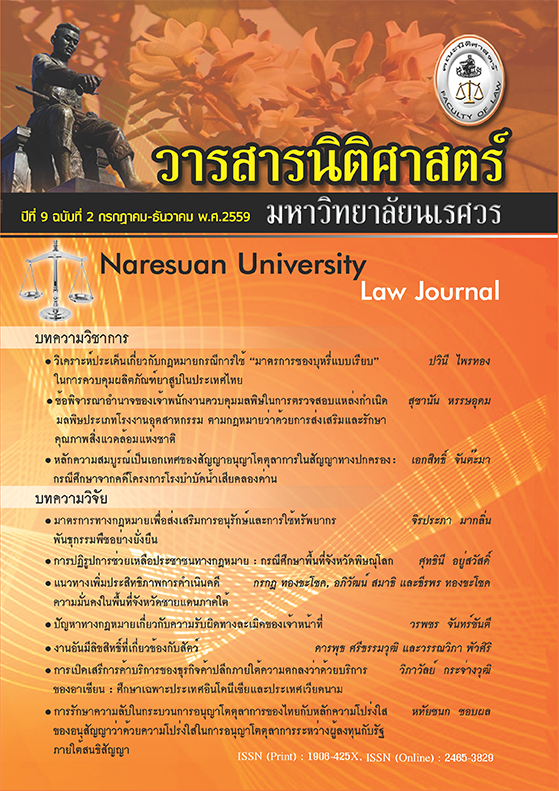Principle of the Autonomy of Arbitration Agreement in Administrative Contracts : Lesson from the Case of the Klong Dan Wastewater Treatment...
Main Article Content
Abstract
An arbitration clause or arbitration agreement, as specified by the parties in any contracts or agreements (private agreement or administrative agreement) is a contractual clause that must be considered as a separate and valid clause apart from the main agreement. This arbitration clause continues to be valid among parties even if the main agreement is void or later declared to be invalid. An arbitration clause therein derives from the intention of all parties to fix an applicable law of procedure for the dispute resolution between them. In contrast, if the arbitration clause is considered to be void or invalid together with the invalid main agreement, this clause shall never come into effect or be enforceable. In such case, there is no interest to specify such clause in any agreement. The Supreme Administrative Court’s decision in the Klong Dan Wastewater Treatment Plant case (“Klong Dan Case”) is a good sample of the application of the principle of the autonomy of arbitration agreement in an administrative contract, in the same manner as in a private agreement. This Klong Dan Case also reveals the misinterpretation of the arbitration clause by the state party that may be caused by the lack of good comprehension in the principle of autonomy of arbitration agreement, which resulted in its responsibility for compensation to another party. This article aims to emphasize an importance and legal impacts of an arbitration clause as specified in any kind of agreement to show its effect on obligations of the parties to any contracts. It will study the jurisprudence of the Supreme Administrative Court’s decision in the “Klong Dan Case” in order to further obtain lesson and a better practice of the execution of an administrative contract and an appropriate administration of administrative contracts containing an arbitration clause.
Article Details
References
Pongsuwan, P. “Arbitration in administrative contracts : Principle of law and prac-tices.” TU Law Journal. 36, no.1 (2007). [In Thai]
Atsavaroth, S. Commercial dispute resolutions by arbitration. Bangkok: Tham-masat, 2011. [In Thai]
Atsavaroth, S. “Arbitration and administrative contract: A necessity for Thailand?.” TU Law Journal. 39, no 2 (2010). [In Thai]
Chantraophakorn, A. “The role of arbitrators in contract disputes arising from or relating to a bribery or a misconduct of official.” Arbitration Journal, 4, 2009. [In Thai]
Ancel, J.-P. “L’actualité de l’autonomie de la clause compromissoire.” Travaux du comité français de droit international privé. 1991-1992, Pédone, France: L'Harmattan, 1994.
Born, G. A. International Commercial Arbitration. The Hague: Kluwer International Law, 2001.
Derains, Y. and Schwartz, E. A. A guide to the new ICC rules of arbitration. The Hague: Kluwer International Law, 1988.
Gaillard, E. and Savage, J. (eds.). Fouchard, Guillard, Goldman on international commercial arbitration. The Hague: Kluwer International Law, 1999.
Lew, D. M. “The law applicable to the form and substance of the arbitration clause.” In ICCA Congress Series no. 9 (1998): 114.
Park, W. W. “Determining arbitral jurisdiction: Allocation of tasks between courts and arbitrators.” American Review of International Arbitration. 8, (1997): 133.
Racine, J-B. “Réflexions sur l’autonomie de l’arbitrage commercial international.” Rev. arb., 1994.
Samuel, A. “Seperability of arbitration clauses – some awkward questions about the law of contracts, conflict of laws and the administration of justice.” Arbitration and Dispute Resolution Law Journal, 36, 2000.


